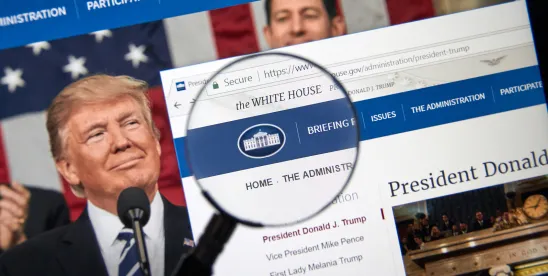Takeaways
- Republicans in the U.S. House of Representatives attempt to deliver on President Trump’s campaign promises in the One Big Beautiful Bill Act (BBB or the Act), which passed the House by a razor-thin margin of 215 in favor and 214 opposed on May 22, 2025.
- BBB shows favoritism of Health Savings Accounts and Health Reimbursement Account benefits, making changes to broaden their scope, increase utilization, and bolster savings.
- The Act also provides a glimpse into legislative or regulatory changes that may be on the horizon for ERISA-governed plans, including standards for Pharmacy Benefit Manager compensation, contractual requirements, and disclosures applicable to government-subsidized plans.
The goal of the U.S. Senate is to pass One Big Beautiful Bill in a form on which Senators can agree, send it back to the U.S. House of Representatives, who then would have it on President Trump’s desk for signature by July 4, 2025. Time will tell whether this accelerated schedule is practical and what ultimately makes its way into federal law.
Without getting too far ahead of the legislative process and certainly staying out of the weeds of the 1,038 pages of legislative proposals, the BBB reveals fringe benefit, health and welfare benefit, and executive compensation priorities. The legislation also tips the hand of the Trump Administration, shining a light on areas in which we may see additional activity.
HSA, HRA Improvements
It is clear that House Republicans like Health Savings Accounts (HSA) and Health Reimbursement Accounts (HRA). There are pages of text aimed at expanding eligibility (including permitting Medicare-eligible enrollees to contribute to HSAs), increasing savings opportunities, allowing rollovers from other healthcare accounts, and permitting the reimbursement of qualified sports and fitness expenses. If the Act becomes law, employers offering HSA or HRA benefits will have some new bells and whistles to add to their programs.
Fringe Benefits That Make Education and Childcare More Affordable
With a focus on families and paying down student loan debt, BBB makes permanent an employer’s ability to make student loan debt repayments on a tax-favored basis under Section 127 of the tax code. BBB also enhances the employer-provided childcare tax credit, further incentivizing employers to provide childcare services to their employees. Whether the employer operates a childcare facility or pays amounts under a contract with a qualified childcare facility, BBB entices employers to add this much-needed employee benefit.
Executive Compensation Changes
The executive compensation changes baked into BBB are designed to help pay for some of the other changes. BBB expands the application of the excise tax on certain tax-exempt organizations paying compensation over $1 million (or excess parachute payments) to include former employees (think: severance). BBB also requires public companies to allocate the Internal Revenue Code Section 162(m) $1 million deduction limit among controlled group members relative to compensation when specified covered employees receive pay from those related employers.
Tax Cuts and Jobs Act Extension
A priority of President Trump, who touted extending his tax cuts during the campaign trail, BBB extends and makes permanent the Tax Cuts and Jobs Act changes. For example, BBB permanently makes qualified moving expense reimbursements taxable.
Pharmacy Benefit Manager Regulation
BBB also includes a few surprise new twists related to Pharmacy Benefit Managers (PBM). Although the legislative reforms currently focus on Medicaid and prescription drug programs subsidized by the federal government (e.g., Medicare Part D plans, including Employer Group Waiver Plans for retirees absent a waiver), it is clear that the Trump Administration and Republicans in Congress seek transparent and fair pricing of prescription drugs. These initiatives eventually may spill over to apply to ERISA-governed plans, in furtherance of President Trump’s Executive Orders advancing Most-Favored Nation prescription drug pricing and directing increased transparency over PBM direct and indirect compensation. So, the changes are worthy of note by all employers that use PBMs.
For Medicaid, BBB prohibits the “spread pricing” model in favor of “transparent prescription drug pass-through pricing model,” which essentially is cost-plus pricing. No more than fair market value can be paid for PBM administrative services.
In the case of Medicare Part D plans, BBB imposes contractual requirements limiting PBM compensation to bona fide service fees. Rebates, incentives, and other price concessions all would need to be passed on to the plan sponsor. Further, the PBM would be required to define and apply in a fully transparent and consistent manner against pricing guarantees and performance measures terms such as “generic drug,” “brand name drug,” and “specialty drug.”
Transparency also is paramount. BBB requires PBMs not only to disclose their compensation, but also their costs and any contractual arrangements with drug manufacturers for rebates, among other details.
It certainly is possible these PBM reforms are coming to an ERISA plan near you. BBB provides a roadmap for the Department of Labor’s Employee Benefits Security Administration to issue ERISA fiduciary standards, best practices, or disclosure requirements.




 />i
/>i

